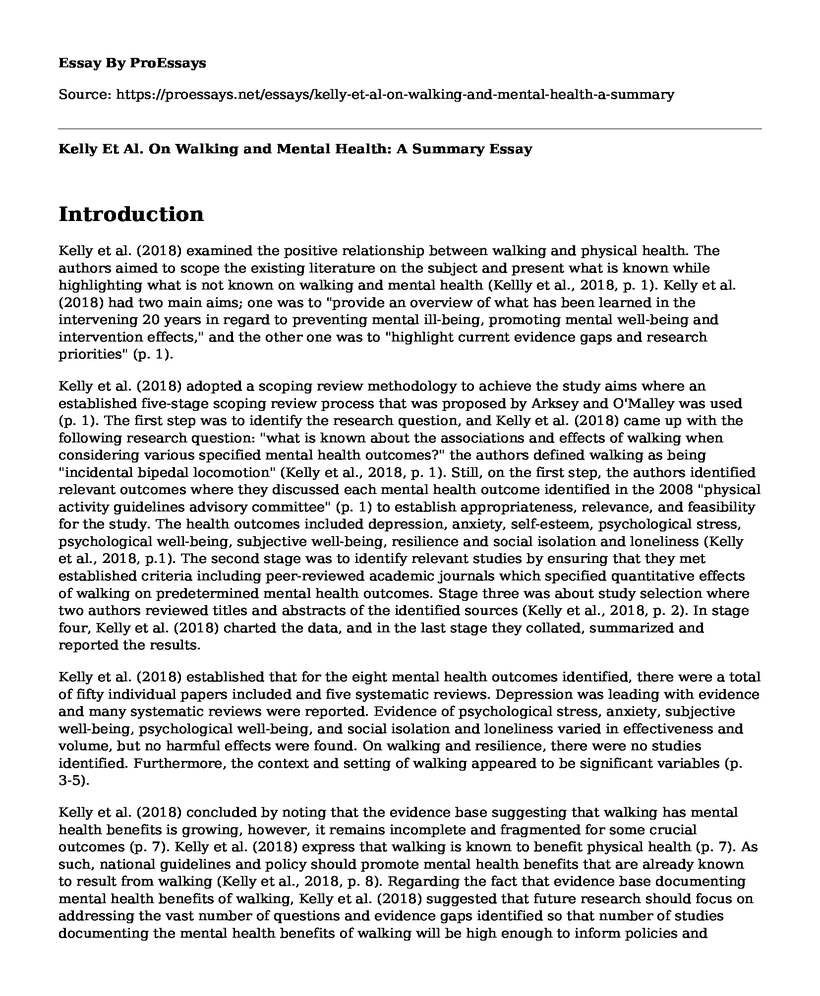Introduction
Kelly et al. (2018) examined the positive relationship between walking and physical health. The authors aimed to scope the existing literature on the subject and present what is known while highlighting what is not known on walking and mental health (Kellly et al., 2018, p. 1). Kelly et al. (2018) had two main aims; one was to "provide an overview of what has been learned in the intervening 20 years in regard to preventing mental ill-being, promoting mental well-being and intervention effects," and the other one was to "highlight current evidence gaps and research priorities" (p. 1).
Kelly et al. (2018) adopted a scoping review methodology to achieve the study aims where an established five-stage scoping review process that was proposed by Arksey and O'Malley was used (p. 1). The first step was to identify the research question, and Kelly et al. (2018) came up with the following research question: "what is known about the associations and effects of walking when considering various specified mental health outcomes?" the authors defined walking as being "incidental bipedal locomotion" (Kelly et al., 2018, p. 1). Still, on the first step, the authors identified relevant outcomes where they discussed each mental health outcome identified in the 2008 "physical activity guidelines advisory committee" (p. 1) to establish appropriateness, relevance, and feasibility for the study. The health outcomes included depression, anxiety, self-esteem, psychological stress, psychological well-being, subjective well-being, resilience and social isolation and loneliness (Kelly et al., 2018, p.1). The second stage was to identify relevant studies by ensuring that they met established criteria including peer-reviewed academic journals which specified quantitative effects of walking on predetermined mental health outcomes. Stage three was about study selection where two authors reviewed titles and abstracts of the identified sources (Kelly et al., 2018, p. 2). In stage four, Kelly et al. (2018) charted the data, and in the last stage they collated, summarized and reported the results.
Kelly et al. (2018) established that for the eight mental health outcomes identified, there were a total of fifty individual papers included and five systematic reviews. Depression was leading with evidence and many systematic reviews were reported. Evidence of psychological stress, anxiety, subjective well-being, psychological well-being, and social isolation and loneliness varied in effectiveness and volume, but no harmful effects were found. On walking and resilience, there were no studies identified. Furthermore, the context and setting of walking appeared to be significant variables (p. 3-5).
Kelly et al. (2018) concluded by noting that the evidence base suggesting that walking has mental health benefits is growing, however, it remains incomplete and fragmented for some crucial outcomes (p. 7). Kelly et al. (2018) express that walking is known to benefit physical health (p. 7). As such, national guidelines and policy should promote mental health benefits that are already known to result from walking (Kelly et al., 2018, p. 8). Regarding the fact that evidence base documenting mental health benefits of walking, Kelly et al. (2018) suggested that future research should focus on addressing the vast number of questions and evidence gaps identified so that number of studies documenting the mental health benefits of walking will be high enough to inform policies and practice. Nonetheless, the study was the first paper to undertake a broad range of mental health outcomes specifically linked to walking (Kelly et al., 2018, p.9).
References
Kelly, P., Williamson, C., Niven, A. G., Hunter, R., Mutrie, N., & Richards, J. (2018). Walking on sunshine: scoping review of the evidence for walking and mental health. Br J Sports Med, 52(12), 800-806.
Cite this page
Kelly Et Al. On Walking and Mental Health: A Summary. (2022, Aug 15). Retrieved from https://proessays.net/essays/kelly-et-al-on-walking-and-mental-health-a-summary
If you are the original author of this essay and no longer wish to have it published on the ProEssays website, please click below to request its removal:
- Paper Example on Burnout and PTSD
- Essay Example on Increase in Suicidal Ideation: What Nurses Can Do
- Essay on Health Psychology: Understanding Behavioral, Psychological & Cultural Influences
- Essay Sample on Personality & Leadership: A Definition and Role in Society
- Free Report Example on Bullying: A Global Threat Needing Immediate Intervention
- The Power of Leadership: Impacting Followers and Organizations - Essay Sample
- Paper on Job Interview Questions: Excel Gant Charts, Capital Structure, Disagreements with Colleagues







